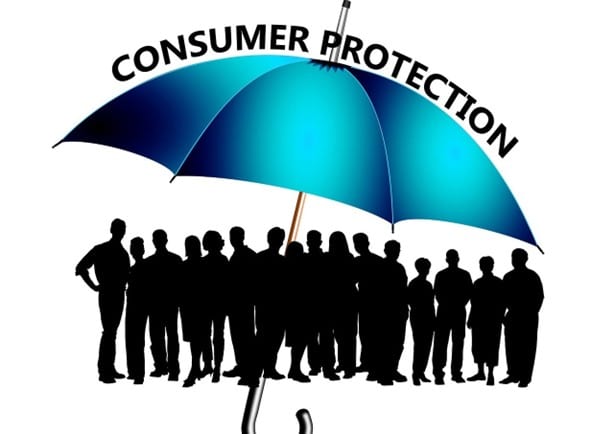Is Your Financial Data Safe? CFPB Shutdown Explained

A new director, the end of the Biden administration, and the looming threat of being defunded seem to signal the impending demise of government watchdog agency the Consumer Financial Protection Bureau.
President-Elect Trump's decision to fire CFPB Director Rohit Chopra with Russell Vought, who is the Office of Management and Budget Director. Vought’s first task after being appointed was to order the agency to “halt it's work and shut its doors”(1), launching a litany of lawsuits including one by the National Treasury Employees Union and one filed by California Aspen's 22 other state attorneys general.
CFPB Shutdown Launches Lawsuits & Plenty of Protests
California Attorney General Rob Bonta and 22 others – including Maryland, New York, New Jersey, Arizona, and Washington D.C. – filed a joint lawsuit alleging the CFPB shutdown “harms consumers and states’ efforts to protect them.”
A federal lawsuit filed by the NTEU, which represents employees of the watchdog agency, argues that Vought’s actions “violated the Constitution by undercutting Congress' power to set and fund the agency's mission.”
An order issued by US District Judge Amy Berman Jackson said the Trump administration “shall not delete, destroy, remove, or impair any data or other CFPB records covered by the Federal Records Act”(2), except when allowed under federal law(2).
What the CFPB Actually Does
The Consumer Financial Protection Bureau (CFPB) is a watchdog agency designed to protect consumers in the financial marketplace. According to its website (which went dark on Feb. 8th, the same day that Vought wrote on “X” that the agency funding was “excessive”) (3), the CFPB was launched to “protect consumers from unfair, deceptive, or abusive practices and take action against companies that break the law. We arm people with the information, steps, and tools that they need to make smart financial decisions.”(4)
Established in 2011 in the wake of the ‘08 financial crisis, the CFPB’s core mission is to protect consumers in the financial marketplace. This involves a broad range of activities, including writing and enforcing rules for financial institutions, supervising these institutions, and educating consumers about financial products and services. Essentially, the CFPB aims to ensure that banks, credit unions, mortgage lenders, and other financial companies treat consumers fairly.
A key aspect of the CFPB's work is its focus on making financial markets more transparent. The agency strives to ensure that consumers have access to clear and understandable information about financial products, enabling them to make informed decisions. Additionally, the CFPB provides a platform for consumers to file complaints about financial institutions, allowing the agency to identify and address unfair or deceptive practices. By actively monitoring the financial marketplace and taking enforcement actions against those who violate consumer protection laws, the CFPB plays a vital role in safeguarding the financial well-being of American consumers.
Legal Battles and Constitutional Challenges:
A defunding or shutdown of this agency raises serious concerns about the vulnerability of millions of Americans to predatory financial practices. Some experts warn that a CFPB shutdown would inevitably trigger a cascade of legal challenges. As demonstrated by California's recent lawsuit following the closure of a similar consumer protection agency, states are prepared to take aggressive action to safeguard their residents. California's lawsuit, for example, highlights concerns about the impact on vulnerable populations and the enforcement of vital consumer protection laws. This legal action underscores the likelihood of jurisdictional disputes, as state attorneys general seek to fill the regulatory void left by the federal agency.
A CFPB shutdown would almost certainly ignite a complex web of legal battles and constitutional challenges. The agency's unique structure, designed to ensure its independence from political influence, has already been a source of legal contention. A shutdown would likely prompt lawsuits arguing that such an action exceeds executive authority and undermines the agency's congressionally mandated mission. States, consumer advocacy groups, and even financial institutions would likely engage in litigation, creating a period of significant legal uncertainty.
These challenges could delve into questions of separation of powers, the scope of presidential authority over independent agencies, and the balance between federal and state regulatory powers. Ultimately, these legal battles could lead to landmark court decisions that reshape the landscape of consumer financial protection.
The Shutdown: A Void in Consumer Protection
The CFPB, established in the wake of the 2008 financial crisis, plays a crucial role in regulating financial institutions, enforcing consumer protection laws, and educating the public. A shutdown would create a significant void, leaving consumers without a federal agency dedicated to:
- Enforcing Consumer Protection Laws: Without the CFPB, enforcement of laws related to fair lending, debt collection, and credit reporting would be significantly weakened.
- Supervising Financial Institutions: Banks, credit unions, and other financial entities would face less oversight, potentially leading to increased risk of consumer abuse.
- Handling Consumer Complaints: The CFPB acts as a crucial channel for consumers to report unfair or deceptive practices. A shutdown would leave these complaints – which, according to the official CFPB website, averages approximately 145,000 per month – unaddressed.
Providing Financial Education: The agency offers valuable resources to help consumers make informed financial decisions. This vital service would cease.

A CFPB shutdown would likely trigger a flurry of legal challenges. Lawsuits could arise from:
- States attempting to fill the regulatory gap. State attorneys general might seek to enforce federal consumer protection laws, leading to jurisdictional disputes.
- Consumer advocacy groups challenging the legality of the shutdown. Arguments could center on the agency's independence and the legality of any actions taken to close it.
- Financial institutions seeking to avoid compliance. Some institutions might attempt to exploit the regulatory vacuum, leading to legal battles over their obligations.
- Constitutional challenges and questions. There could be constitutional challenges regarding the executive branch's power over independent agencies.
The CFPB's unique structure, designed to ensure its independence, has already been a subject of legal debate. Any shutdown would likely reignite these discussions, potentially leading to landmark court decisions.
Public Protests and Consumer Advocacy
Experts warn that it's likely a full-blown shutdown would cause widespread public protests and mobilization by consumer advocacy groups. These actions could include:
- Organized Demonstrations: Protests in major cities and Washington, D.C., could draw attention to the potential harm to consumers.
- Grassroots Campaigns: Advocacy groups would likely launch campaigns to educate the public and pressure policymakers.
- Social Media Activism: Online platforms would be used to raise awareness and mobilize support for consumer protection.
- Consumer Boycotts: Consumers might choose to boycott financial institutions perceived as taking advantage of the regulatory vacuum.
The level of public outcry would depend on the perceived impact of the shutdown on consumers' financial well-being.
The Impact on Vulnerable Populations
The effects of a CFPB shutdown would disproportionately affect vulnerable populations, including (but not limited to):
- Low-income Individuals: These individuals are more likely to rely on payday loans and other high-cost financial products, which could become more predatory without CFPB oversight.
- Seniors: Elderly individuals are often targeted by financial scams and may struggle to navigate the financial marketplace without the CFPB's resources.
- Minority Communities: Historically marginalized communities may face increased discrimination in lending and other financial services.
Conclusion & Final Thoughts
A CFPB shutdown would create a significant risk to consumer protection, potentially leading to increased financial abuse and exploitation. The ensuing legal battles and public protests would highlight the importance of safeguarding consumers' financial well-being. While the future of the CFPB remains uncertain, it's clear that the agency plays a vital role in protecting American consumers.
